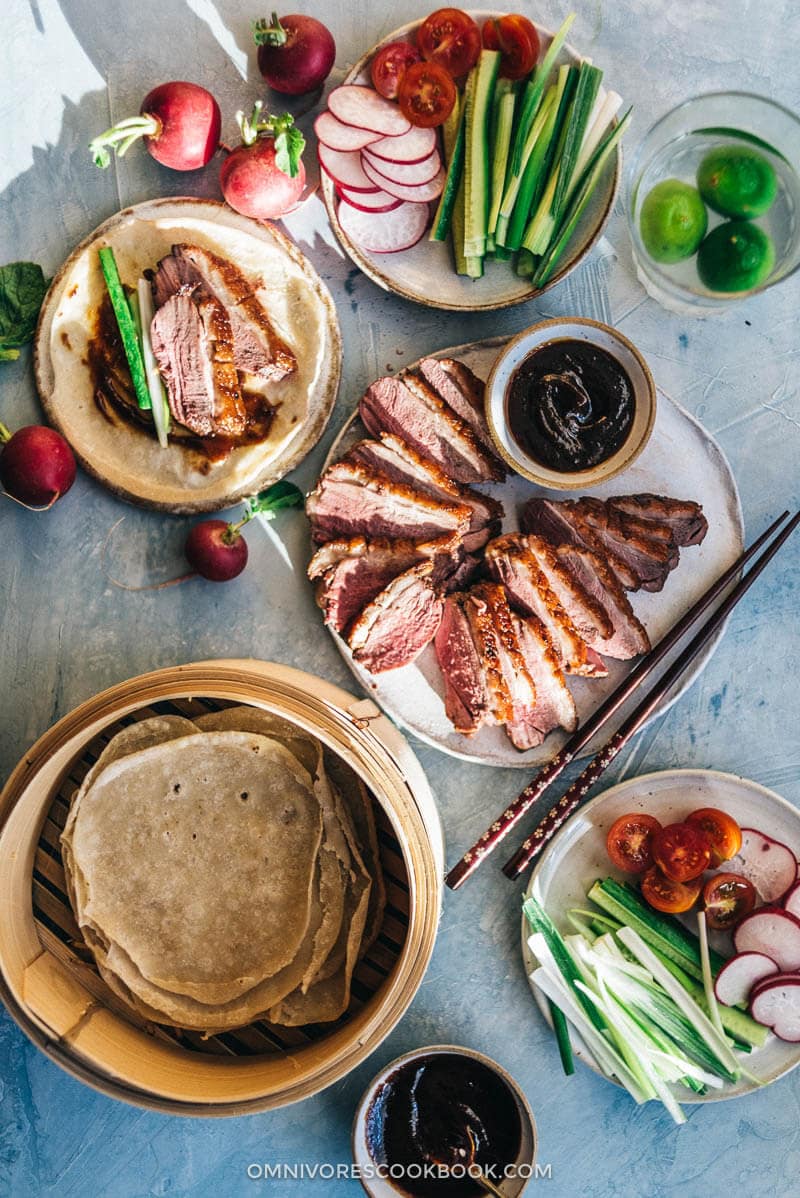
Growing up in Beijing, I was spoiled by fantastic duck dishes. Imagine hunting down the best BBQ joint in Texas, or the best Fish n’ Chips in London. In Beijing we’d weed through hundreds of Peking duck restaurants to find the best spot. Some famous brands have a long history and many branches; for example Quan Ju De (全聚德), the most well-known restaurant, opened their first store in 1864. Bian Yi Fang (便宜坊), another famous chain, was created in 1416. Even for top chains like these, we’re very picky about which eatery to go to get the highest quality duck.
Over the years I’ve received quite a lot of requests for Cantonese roast duck and Peking duck recipes. I’ve been working on them constantly, but so far I haven’t found a recipe that I’m satisfied enough to publish on this blog. Mastering the technique of roasting Peking duck is a long journey that I have yet to conquer. That being said, it doesn’t mean that we have to book a trip to Beijing to enjoy delightful Peking duck rolls.
Recently I received some fresh duck from Tasty Duck – a well-known duck supplier in North America. They partner with 27 local farm families throughout Pennsylvania to raise Peking ducks. The flocks are humanely raised free-roaming in temperature-controlled barns, fed only corn and soybean without antibiotics or hormones.
Today I want to introduce an easy duck recipe that is practical to cook even on a weekday evening, and two great ways to serve to curb your duck cravings!
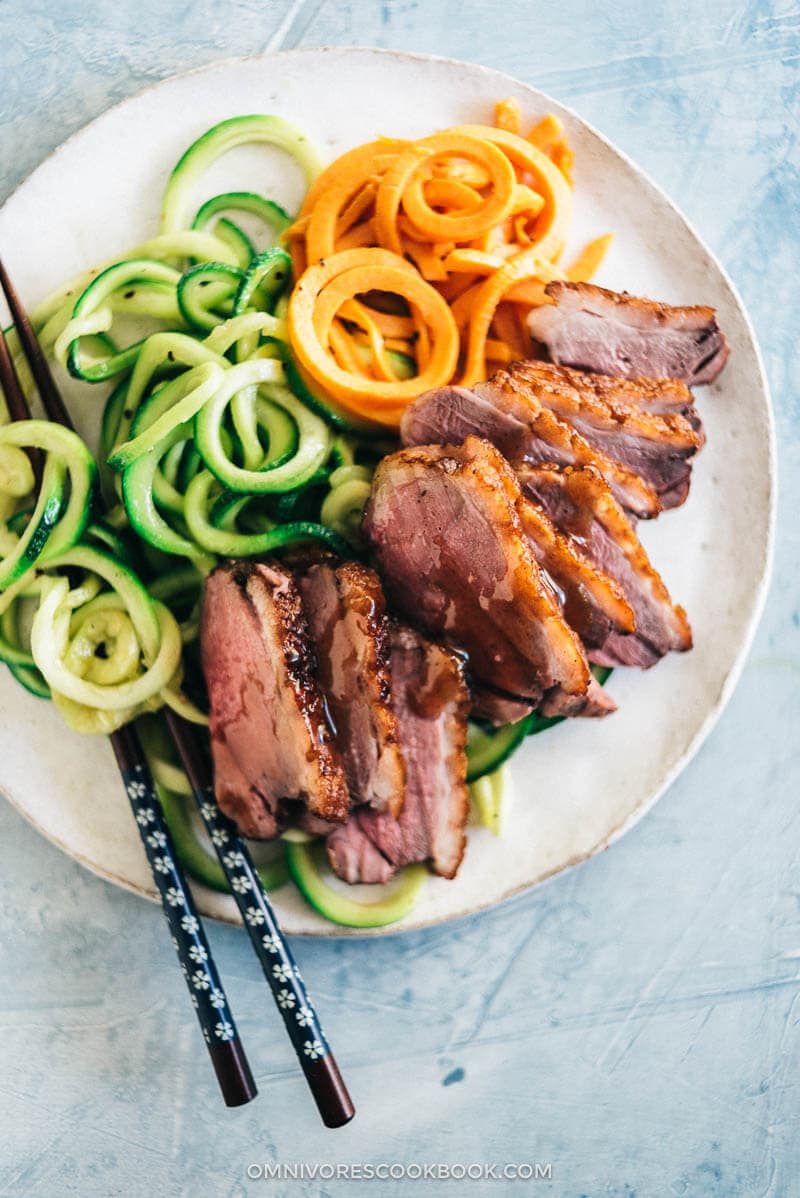
Chinese duck – how to marinate and prepare
- Why marinate?
No matter whether you’re ordering Peking duck or Cantonese roast duck in a Chinese restaurant, you will find the duck skin is super crispy and the meat well-done. It is contrary to the mainstream way – always serve duck breast medium-rare. The truth is, if you marinate the duck before roasting, the meat will remain juicy and tender even when it’s cooked medium or medium-well.
In this recipe we use a simple marinade made with hoisin sauce, cooking wine, five spice, garlic and ginger. Not only does it infuse the duck breast with a nice fragrance and keep the meat tender during cooking, it also eliminates the gamey taste from any wild duck.
- Score the duck before cooking
The other key step is scoring the duck before cooking. I’ve compared cooking scored and unscored duck breast – a scored duck breast will render almost double the amount of fat!
To score the duck without piercing the meat, use a sharp knife and gentle pressure to slice the skin. Note, duck skin is not even and one end is always thicker than the other. So make sure to gradually reduce pressure as you move down.
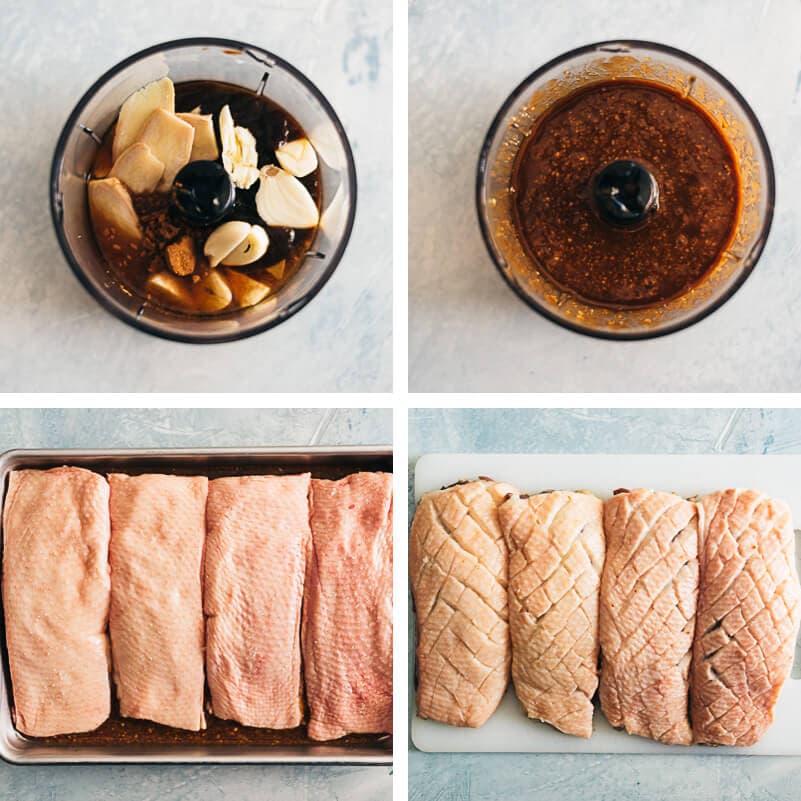
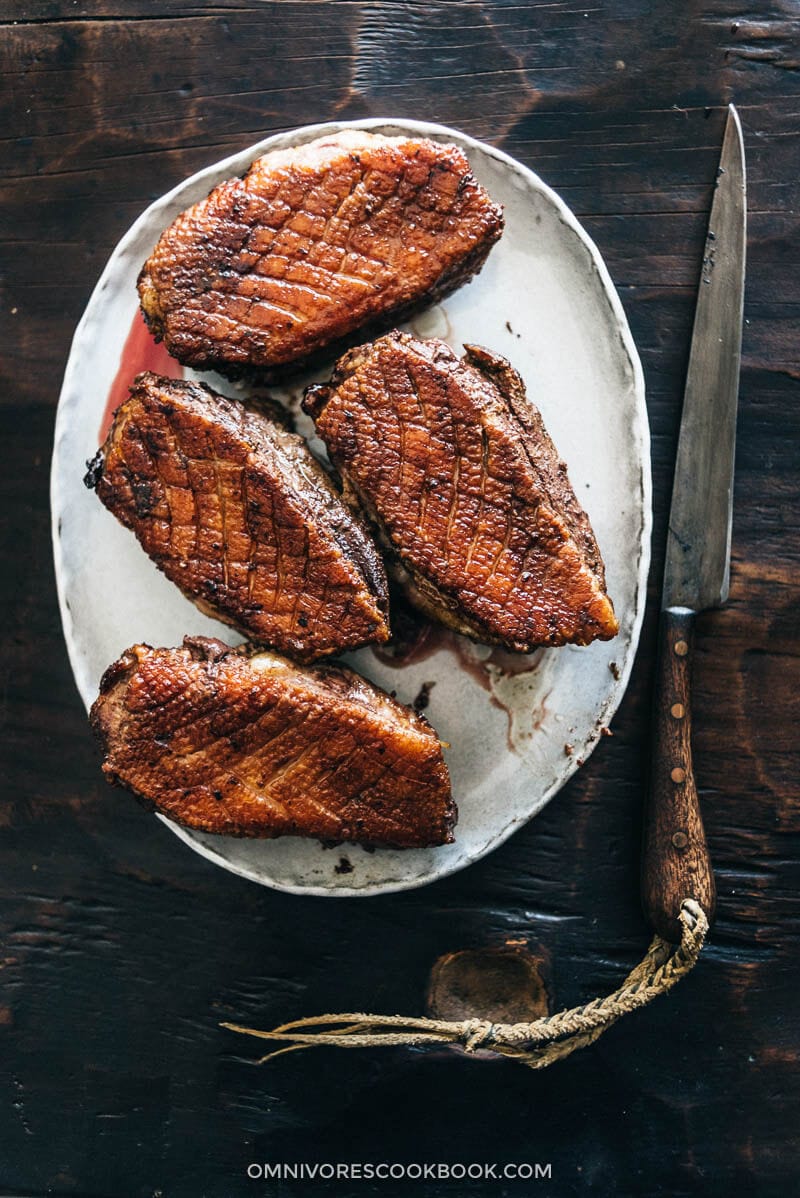
How to cook duck breast
There are two approaches to cook duck breast: the stovetop method, and the stovetop + oven method.
- Smaller cuts: Sear the duck breast and finish it in a skillet
When you use wild duck or any cut of duck breast that is smaller in size and has a thinner skin, the first method is the quickest way to go. For example, when I cook duck breast that weighs about 7-ounces (200 grams) per piece, I simply pan fry it in a skillet (See recipe here).
In this case, simply sprinkle salt on both sides of the duck. Cook the duck breast, skin side down, in a preheated pan with butter (or oil) over medium-low heat. Mallard or Muscovy duck breast skins take about 6 to 8 minutes to crisp up. A small wild duck only needs about 3 to 4 minutes (on medium heat). Then you flip the duck breast to cook the other side, until it reaches medium or medium-rare in the center. It takes another 4 to 5 minutes for larger pieces, and 1 to 2 minutes for small wild ducks.
- Bigger cuts: Cook the duck skin on the stovetop and then finish in an oven
However, the pan-frying method will not create the best results when you cook with larger and fattier duck breast (or goose).
For example, the duck breast I used in this recipe weighs about 12 ounces (340 grams) per piece. The skin is about 1/4-inch (1/2 cm) thick, and the thickest part is almost 1/3-inch (1 cm) thick. To cook large pieces like these, you need to use the second approach to render the duck fat more thoroughly.
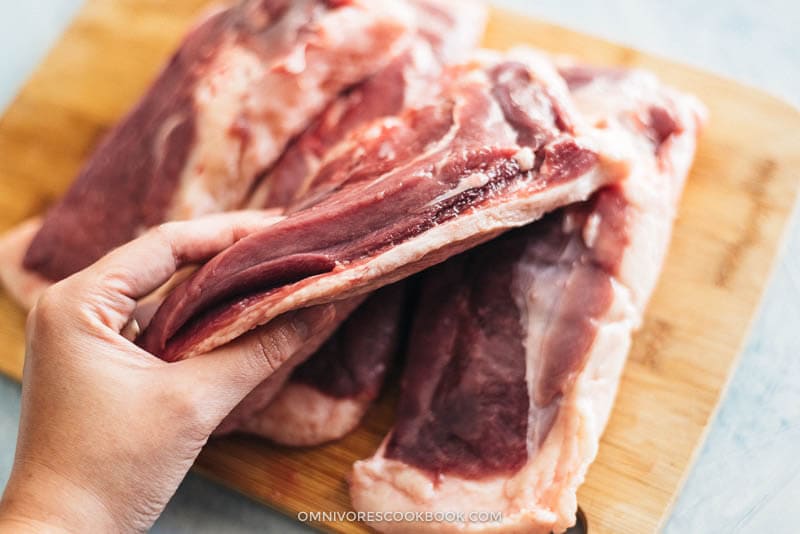
In this case, I used an approach I learned from Duck, Duck, Goose – a cookbook written by Hank Shaw, an award-winning writer and chef whose expertise is cooking with wild game.
Here is the stovetop + oven method:
- Place the duck breast skin side down in a cold skillet and cook over medium heat.
- Once the skin starts to simmer gently, turn to medium-low heat and cook for 10 to 12 minutes. This process is like rendering bacon fat; you want to proceed low and slow.
- Once the skin turns golden brown, transfer the pan into a preheated oven and bake at 425°F (218°C). Keep rendering fat skin-side down for 8 minutes.
- Flip the duck breast and continue to bake for 6 to 8 minutes. The duck will reach medium inside, and the skin will crisp up perfectly.
- Rest the duck without cover, for 10 minutes. This step is very important, because the duck breast will turn crispier when it’s slightly cooled.
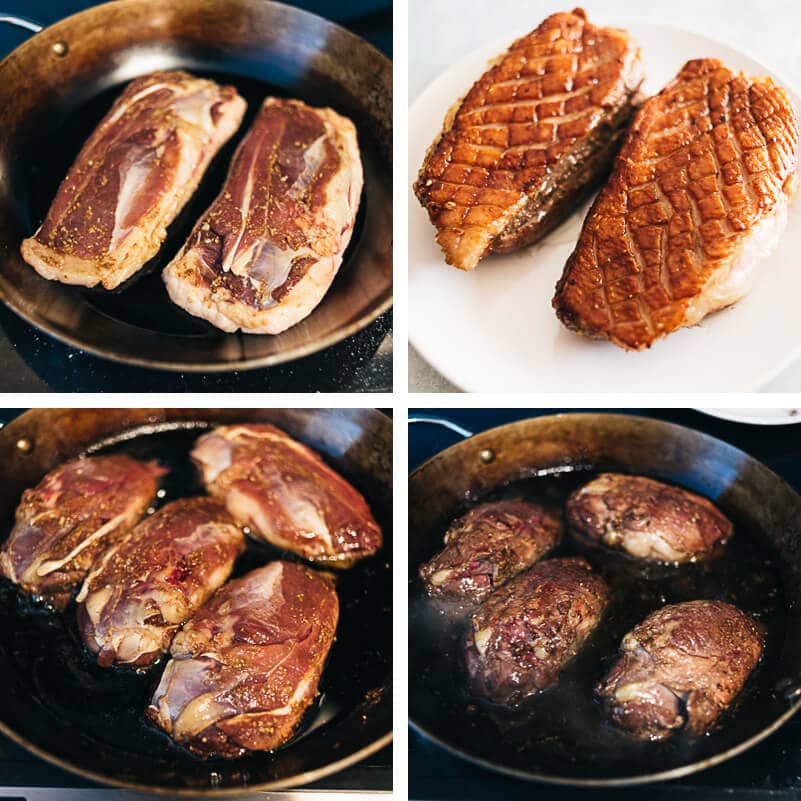
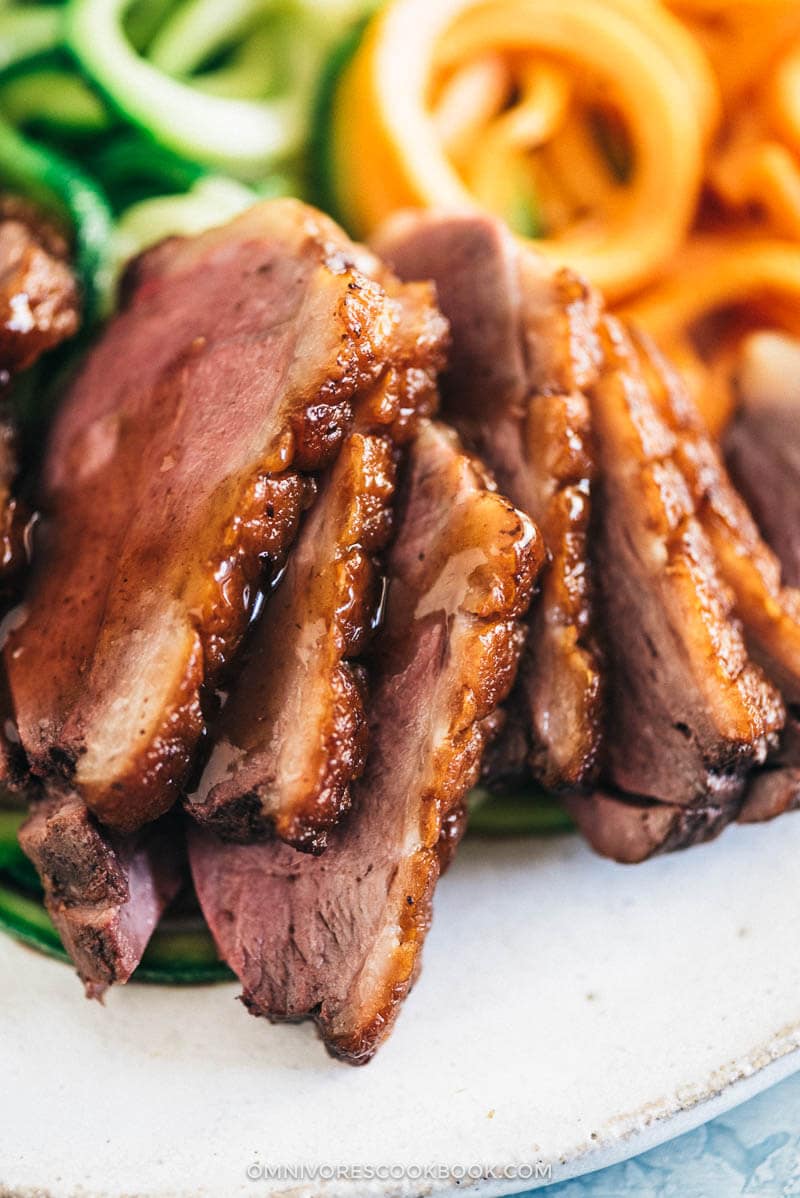
How to serve – Cantonese and Peking duck styles
- Weeknight dinner – Serve the duck Cantonese style
This is the fastest way to serve the duck. Right before baking the duck, transfer 2 tablespoons duck fat into another skillet. Cook spiraled vegetables in the duck fat to get extra delicious veggies – my favorite sides are zucchini and sweet potatoes. Season the veggies with a pinch of salt and black pepper, and cook until tender and caramelized. Then you’ll have a main dish and a colorful side for dinner. For the duck, we simply dip it in plum sauce. YUM!
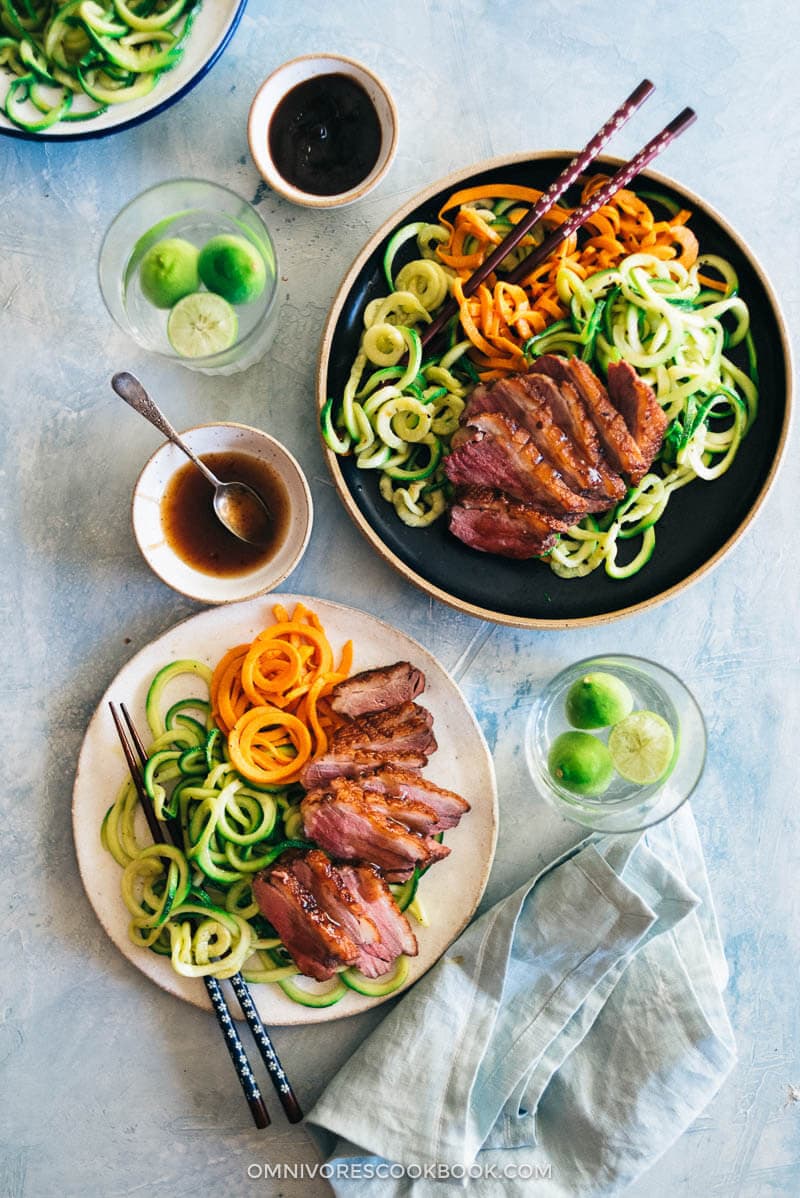
- Sunday dinner party – Serve the duck Peking style
If you’re craving Peking duck, this is the best way to go.
To get the top results, check out my mom’s secret Duck Pancake recipe. You will need an hour to prepare and cook the pancakes, but you will get the most unbelievable pancakes that taste 10 times better than the ones from a frozen package. If you’re hosting a party, you can make these pancakes a few days ahead and reheat them before serving. It is by far the best way to showcase your duck dinner and impress all of your guests!
When you’re ready to serve, slice the duck breast to thin pieces, then serve it with hot pancakes, sliced cucumber and onion, and sweet bean sauce (or hoisin sauce).
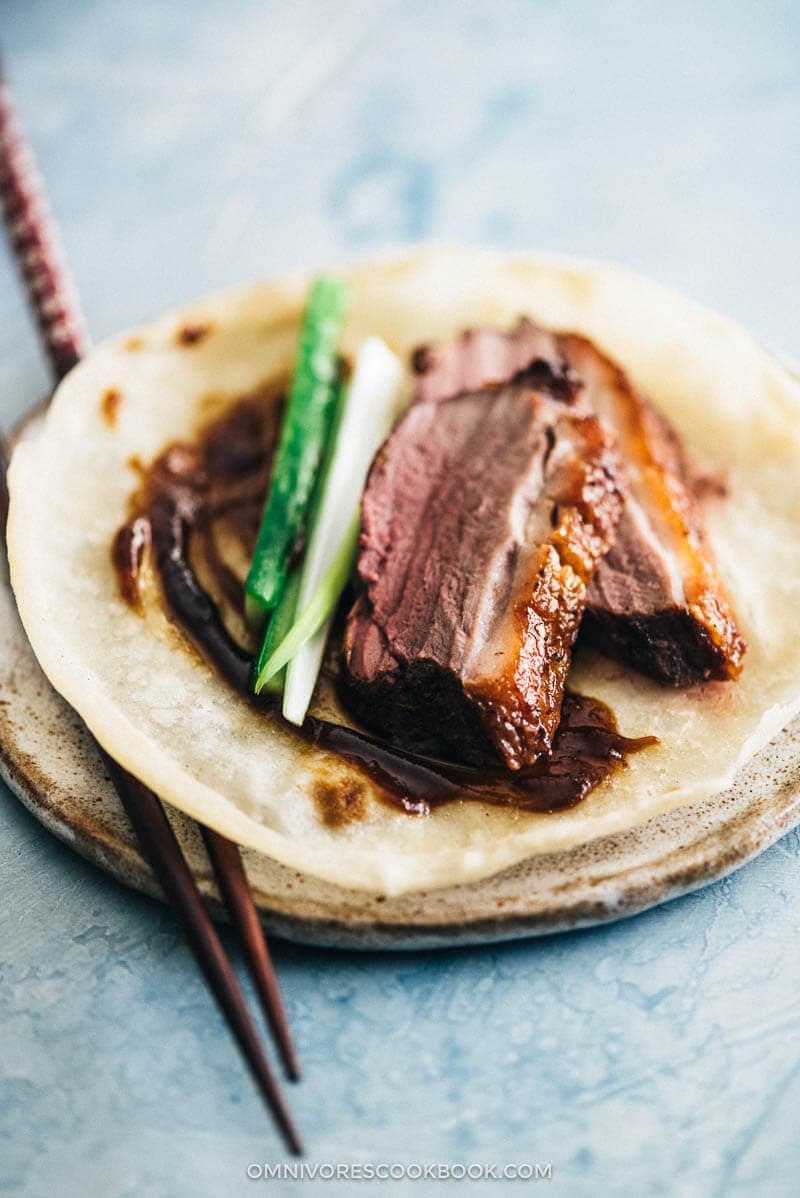
One word about sweet bean sauce (Tian Mian Jiang) – it is the authentic accompaniment to Peking duck – it tastes very similar to hoisin sauce, but less sweet and a bit more savory. Recently I discovered an interesting thing: many Chinese restaurant in the US will give you sweet bean sauce when you order Cantonese roast duck or moo shu pork, but they call it hoisin sauce. If you like the sauce that comes with your Chinese takeout but find it tastes different from your hoisin sauce, try out sweet bean sauce – that’s probably what you’ve been eating!
More duck recipes
- The Best Slow Roast Duck – The most popular duck recipe on this blog, I got the recipe from a restaurant chef 🙂
- Mom’s Best Duck Pancakes (春饼, Mandarin Pancakes) – Must-have for Peking duck
- Pan Seared Duck Breast with Persimmon Grapefruit Sauce – A great recipe for smaller cut duck
- Peking Duck Fried Rice – In case you have leftovers
- Mediterranean Slow Roast Duck with Olive Sauce
[one_half_last padding=”0 0 0 5px”]
Chinese Cooking Made Easy
Are you new to this website? This free email series is a great place to start. I’ll walk you through a few of my most popular recipes and show you how and why they work. You’ll quickly start to cook better Chinese food in your own kitchen.
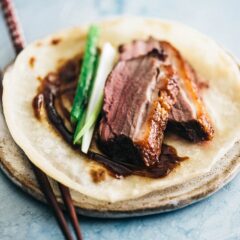
Crispy Chinese Duck Breast
Ingredients
- 4 pieces duck breast (12 oz / 340 g per piece)
- 1/2 teaspoon salt
Marinade
- 1/4 cup hoisin sauce
- 1/4 cup Shaoxing wine (or dry sherry)
- 1/2 teaspoon five spice powder
- 1 thumb ginger , sliced
- 4 cloves garlic , coarsely chopped
Serving Option 1
- 1/4 cup plum sauce
- 1 sweet potato , spiralized to noodles or cut to thin slices with a julienne peeler
- 2 zucchini , spiralized to noodles or cut to thin slices with a julienne peeler
- 1/4 teaspoon salt
Serving Option 2
- 1/4 cup sweet bean sauce (or hoisin sauce)
- 1 cucumber , sliced to strips
- 2 green onion , sliced to strips
- 16 homemade Beijing duck pancakes (or store-bought pancakes)
Instructions
Marinate
- Combine all the marinade ingredients in a tall bowl (or small food processor) and chop with an immersion blender until it forms a runny paste. Pour into a 12-inch (30 cm) tray or baking dish.
- Pat the duck dry with paper towels. Place in the tray with the marinade, skin side up. Sprinkle salt on the skin. Marinate in room temperature for 30 minutes up to 1 hour, or uncovered in the fridge for a couple hours to overnight. In this case, bring the duck to your kitchen counter for at least 20 minutes before cooking, so it will return to room temperature.
Cooking duck
- Preheat oven to 425°F (218°C).
- Right before cooking, pat the duck dry with paper towels. Score the skin 1/2-inch (1 cm) apart to a diamond pattern (but careful not to score the meat).
- You might need to cook the duck in two batches. Place the breast pieces in a cold ovenproof 12-inch heavy skillet, skin-side down. Cook over medium heat, until they’re gently sizzling. Turn to medium-low heat. Cook until the skin turns golden brown, for another 10 to 12 minutes. Flip them over every 3 to 4 minutes. If the duck skin cooks too fast, turn to low heat. Transfer the cooked duck onto a plate and cook the rest using the same method.
- Arrange all the duck pieces in the pan, skin- side down. Transfer the skillet into the oven and bake for 8 minutes, until the skin turns dark brown. Flip to skin-side up and bake for another 6 to 8 minutes, until the skin turns dark brown but not burnt. Transfer the duck onto a big plate, skin-side up. Allow to rest for 10 minutes without cover before carving.
- Prepare the sides while resting the duck.
- If you plan to serve the duck later, wrap each duck breast with aluminum foil when they are warm enough to handle and seal in a bag. Store in the fridge for up to 3 days. When you’re ready to serve, warm them up in a preheated 300°F (150°C) oven for 10 minutes.
- Serving option 1 – Easy weekday dinner
- Transfer 1 tablespoon rendered duck fat into a large skillet. Cook the sweet potato first over medium heat until it’s tender. Then add the zucchini and sprinkle with salt. Cook until the zucchini just turns tender and the sweet potato is almost caramelized. Transfer the ‘noodles’ to serving plates.
- Slice the duck into thin slices and place on top of the vegetables, with plum sauce on the side.
- Enjoy hot as a main dish.
- Serving option 2 – Fancy Peking duck rolls
- To serve Peking duck style, steam the pancakes in a bamboo steamer for 3 to 5 minutes until hot.
- Slice the duck and place them on a plate. Serve with hot pancakes, sweet bean sauce (or hoisin sauce), cucumber and green onions on the side.
- To assemble – place one pancake in the palm of your hand, brush some sauce on the pancake, place 2 to 3 slices duck in the center, top with a few strips of green onions and cucumber. Roll and tuck the pancake like a mini burrito. Repeat, and enjoy hot as a main dish.
Notes
- The nutritional information is calculated based on the duck breast without sides and dipping sauces. In reality, the fat content and the calories will be much lower because you will render about 1 cup of fat from the duck skin.
Nutrition

Did you make this recipe?
I’d love to hear how it turned out for you! Please take a moment to leave a 5-star rating ⭐️ and share your thoughts in the comments further down the page. It really helps others discover the recipe too.

SC
I followed this recipe to the letter.
Very well balanced marinade.
The main difference is that use the “sous-vide” method to cook the meat to 130 deg F . Then I grilled it on the BBQ for color. Couldn’t get the extra-crispy skin though. Maybe there was still too much fat.
Felicia Liu
We made this duck recipe on Christmas Eve and the duck was delicious. Thanks for sharing!
Elisabeth
The duck breast was the best I ever made at home. The only were I have to work on is to get the skin really crispy, But the taste… omg….so delicious. So the next time it will be crispy 🙂 Thank you for the recipe.
winnie thai
Great recipe! really good roast duck break
Alice@beefsteak
hi, thank you for sharing
A great dish combining fruits and vegetables, I love to use vegetable fiber cutter
CDHPL
is this duck halal or haram
San
Hi Maggie, The duck breast looks delicious.
Can I substitute the hoisin sauce for some other sauce?
We have an allergy to hoisin sauce. Thanks
Maggie
Hi San, I have a recipe for homemade hoisin sauce: https://omnivorescookbook.com/homemade-hoisin-sauce
The other alternative is: https://amzn.to/2Hb3f4p
May you one of them will work for you?
Liam Norton
My new go to for Duck!
Reduced left over marinde as sauce and severed over stir fry veges. YUM!
Joanne
I am so pleased I found this blog. I have bought some “magret de canard” for christmas but chickened out in cooking them as for years I have never been able to get them tender and ended up putting them in the freezer. In local restaurants (France and Luxembourg) duck breasts are the only thing they serve and I always wondered how they cooked them. They are usually crispy on the outside and well cooked and we often get them with the pancakes. Here it is served with leeks rather than spring onions which are not readily available which is a bit chewy. Also a sauce included which they call bbq sauce. The horrible thing is in some restaurants they prewrap them in the pancakes and fry the pancakes in a pan to reheat which makes them go hard……..
My duck breasts are about 350 grs each which would be just about enough for two of us. How would I adjust the marinade for just one duck breast ? or could I make the full amount and freeze the marinade down. You say the duck can be kept in fridge and reheated later. Could I cook them and freeze them as well ? Am looking forward to browsing your blog. Though not sure if I will find a lot of the ingredients you mention will definitely try. I have a lovely friend from Beijing but she does not really like to cook 🙁 I have been trying to find someone to teach me how to do chinese cooking for a while as restaurant food here tends to taste the same everywhere with too much MSG in it which I have more and more problems digesting.
Maggie
Hi Joanne, I’d recommend you to make the full bath marinade because the food processor probably won’t run if you cut the ingredients. Plus, depending on the container you use to marinate the duck, you might need a bit more marinade to submerge the duck breast. And yes, you can freeze the extra marinade in the freezer. It’s a great marinade for chicken as well.
You can freeze the cooked duck breast. I would wrap them tightly in the foil then in a ziplock bag, press out as much air as possible. This prevents from freezer burn and keeps the duck breast moist. You need to naturally thaw them in the fridge overnight before serving the frozen ones. Once completely thawed, reheat in the oven until it’s heated through and the skin is crispy.
Abbe@This is How I Cook
Great post and very informative. I have some duck breasts in the freezer and can’t wait to give this a try!
Valentina
Super bueno yamyyy
Alice
Great method of producing peking duck at home. For dinner parties I render fat of the skin a few hours in advance and just finish in the oven or air fryer just before serving. I find scoring the skin horizontally looks neater when you slice the duck for serving. I aso render off the most fat when I place a second skillet on top of the frying pan with a weight (such as a kettle of water) to really press down the skin.
Eric
Any advice on how to do it so that the meat is well done?y my wife is pregnant and it’s advised that pregnant women eat well done meat.
Thanks!
Maggie
Hi Eric, the best way to measure doneness is to use a thermometer and cook the duck until it reaches 165°F. If you do not have a thermometer, you might need to pull out the duck during baking, slice it and see whether it’s cooked (the juice runs clear and no pink meat inside). The cooking time varies a lot, depends on the cut you get. I used very large duck breast in my recipe, so it took 14 to 16 minutes to get a medium duck breast. This cooking time will probably cook through most of the medium-sized duck breast. A smaller cut will take about 10 to 12 minutes to cook through.
I hope you and your wife will able to enjoy the dish 🙂 Happy cooking!
Philip | Dream Kitchen Solutions
Never been a great duck fan!! But I have to admit that this was good!! A delicious yet simple recipe. Thanks Maggie for sharing this wonderful recipe!
Catering Den Haag
This looks like the perfect dish! Yum!
Amy
Oh mercy, yum! Thanks for the recipe.
Healthy World Cuisine
Looks absolutely delicious Maggie! Crispy skin and juicy on the inside. Yes it is very difficult to recreate the Beijing style duck as they have a very special process with very different equipment than we have at home. However, your way is a great alternative using all the things we have access to at home. Wishing you a super week! Sharing, of course!
Maggie
Yes recreating Peking duck is a real challenge and I’m not sure it possible to do it at home. Meanwhile I’d settle down on the duck breast 🙂
Thanks for sharing and have an awesome week!
Marlene
Thanks so much for sharing these recipes, Maggie. I have several large duck D’Artagnan duck breasts in the freezer and will make your recipe very soon. It’s so helpful to have directions for both small and large duck breasts. I know my husband (aka Mr. Fussy) will be very happy that I found a bette way to make the duck!
Maggie
You’re the most welcome Marlene! How do you usually cook duck? I hope you will like this one. Let me know how the dish turns out if you decide to try!
Marlene
Both Mr. Fussy and I raved about this duck, Maggie! I also made the pancakes. Love the marinade! I saved some and mixed it with the hoisin sauce to serve with the pancakes and scallions. Two days later, Mr. F is still talking about how good it was. Cooking first on the stove and then in the oven worked really well for my thick duck breast. I drained the fat before moving it to the oven, which reduced spatters and smoking (and for once my smoke alarm didn’t go off!). I had never combined the two types of heat before, and this worked much better. With a thinner piece of duck, I can do it all on the stove.
Maggie
I’m so glad to hear you tried the recipe Marlene and both of you enjoyed the dish! 🙂
Yes I found cooking thick duck breast is quite tricky, so you need to be patient and render all the fat. It is like cooking a thick cut steak, that you sear the meat on stove then move to the oven to finish. Only in the case of duck we use less heat on stove top.
Thanks for sharing the tip of draining the oil! I’ll need to try that out next time 🙂
Have a great week ahead!
Nagi@RecipeTinEats
Hands down Maggie, you are one of my favourite blogs – and this post is a classic example of why. So well researched, informative, interesting, the different options for cooking depending on duck size, why you haven’t shared a peking duck recipe (same reason as me!) – you have thought of everything. Seriously, in my personal opinion, you are one of the BEST blogs in the world.
Marlene
I am in good company if Nagi feels as I do about your blog, Maggie. I love your Lions Head Meatballs, which I make with a combination of beef and veal. Delicious! Can’t wait to make the duck, as it’s one of my favorites.
Maggie
You just reminded me that I need to try out the meatballs again with beef and veal. It sounds so delicious 🙂
Maggie
Thanks so much Nagi! The words mean a lot to me coming from you 🙂 I think we are both obsessed with finding the perfect method to roast meat. I still remember your dry brined turkey recipe. So much impressive research
and stunning photos! You’re my inspiration 🙂
Milena | Craft Beering
I cannot wait to try this recipe. I was just looking at duck breast a few days ago (new item at our grocery store’s organic meat section:) and wondering how I could prepare them. Perfect timing:) my stars must be aligning! Great explanation about scoring the skin and the cooking time required based on the size. I love the idea of using some of the rendered fat to saute vegetables. Cantonese it will be for us – every single ingredient in the marinade is a fave!
Maggie
Happy cooking Milena! If you have extra duck fat (you will), use them to roast potatoes and you might end up devouring more potatoes than the duck! One of our favorite bars in Florida serve duck fat fried served with cheesy sauce and prosciutto. OMG it makes my mouth watering just thinking about it!